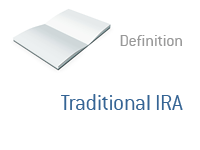Definition of Traditional IRA
What is a “traditional IRA”? What is the definition of the term “traditional IRA”?
Tens of millions of Americans have a “traditional IRA”, which stands for traditional Individual Retirement Account.
The purpose of the traditional IRA is to allow Americans to save for their retirements while deferring some of their tax liabilities into later years (and paying at a lower tax bracket at that time).
 With the traditional IRA, Americans are able to contribute a set amount of money every year. These contributions are tax deductible, meaning that they will lower your tax burden for the current year.
With the traditional IRA, Americans are able to contribute a set amount of money every year. These contributions are tax deductible, meaning that they will lower your tax burden for the current year. Investment gains in the traditional IRA account grow tax-free. However, when a distribution is made, taxes will be owing on the amount of the distribution.
Distributions that are taken before a person turns 59.5 may be subject to a penalty, depending on the circumstance. For instance, if an individual who becomes disabled before the age of 59.5 may withdraw money from a traditional IRA without being subject to an early-withdrawal penalty.
--
Davemanuel.com Articles That Mention Traditional IRA:
Open an IRA - Where Should You Open Your IRA?
